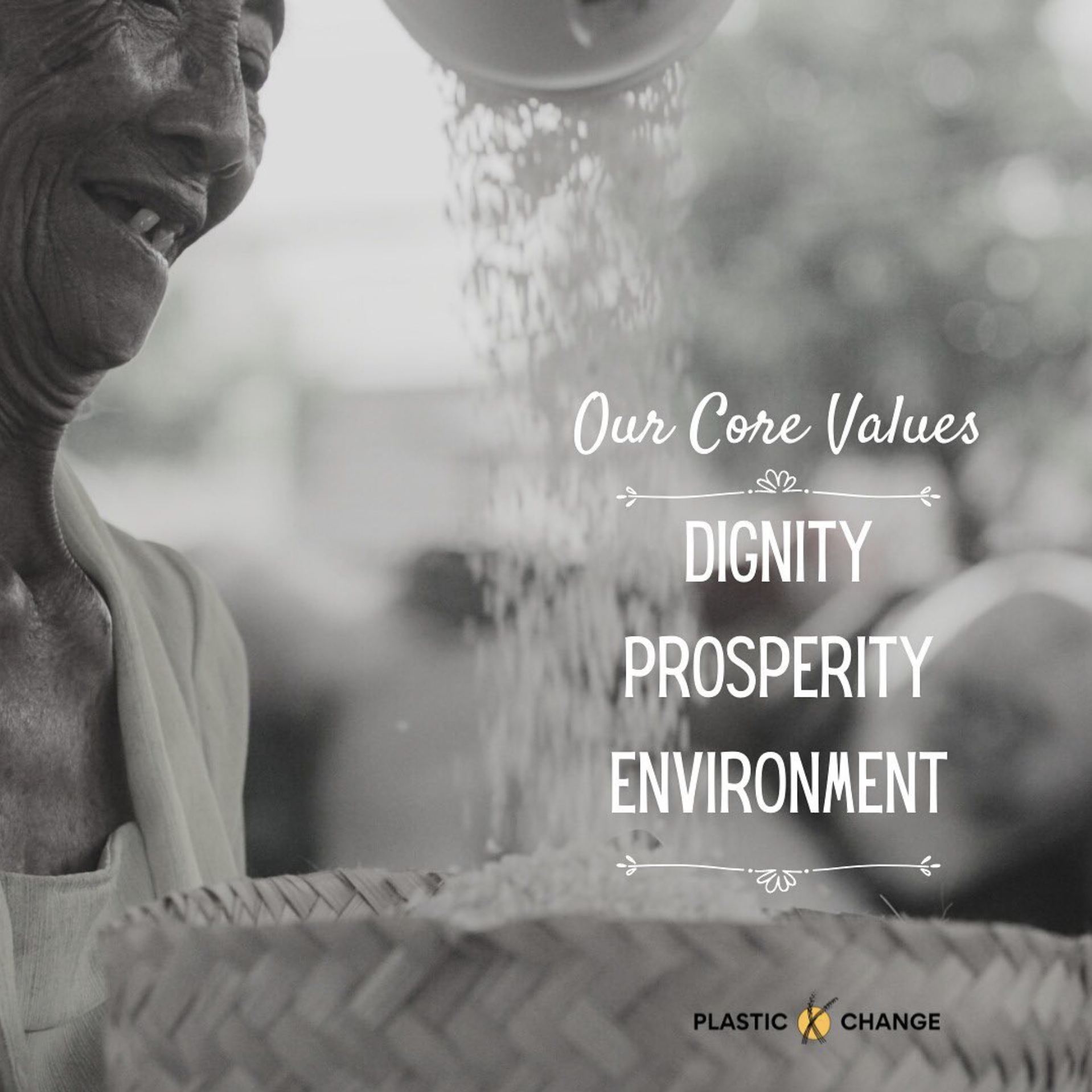What would you pick up plastic for?
Plastic Exchange is feeding Bali
What an honor it was to interview Madè Janur Yasa, founder of Plastic Exchange, environmentalist, and nominee for this year’s CNN Hero of the Year.
There are reuse/recycle plastic initiatives all around the globe, but what makes Plastic Exchange different? RICE. You bring the plastic in, and the Exchange will swap you for rice to feed your family.
As many of you may know, plastic is washing up on the shores everywhere in the world. This is especially noticeable on small islands like Bali, Indonesia. COVID-19 amplified the amount of single-use plastic, which has only made things worse.
Tourism is the beating heart of Bali’s economy, therefore when COVID closed the airports and shut the island down, families struggled to put food on their tables. For the Balinese, rice is the staple of every meal. A common phrase used in Bali is, "if you haven't had rice, then you have not eaten."
All photographs are taken by Plastic Exchange Social Media & Communications Coordinator, Brittany.
Thank you Madé Janur and Plastic Exchange team!
What is Plastic Exchange?
“Plastic for Rice.” The Plastic Exchange (or Plastic X Change) is a sustainability movement that empowers communities to change their waste behavior through dignity-based exchange systems that result in a cleaner, healthier environment.
What inspired you to create Plastic eXchange? How did you come up with the idea? What was your inspiration?
In May 2020, the realized effects of the COVID 19 pandemic had hit Bali and our tourism economy. I needed to do something and saw that people needed food. I got to thinking, inside the challenge there is an opportunity.
If people bring me plastic, I will give them rice. The next day I went to my village in Tabanan and we put this idea into action. Within the first day, we collected 200 kg of plastic and in 17 days, we had collected 2.6 tons.
Pictured:
Top left, Made Janur Yasa working with a village Banjar leader in Bali, Indonesia.
How does Plastic exchange help local Balinese?
The Plastic Exchange empowers DIGNITY.
The Balinese community receives sustenance while maintaining their sense of dignity and strengthening their community.
PXC helps PROMOTE SUSTAINABILITY (CLEAN, HEALTHY ENVIRONMENT)
By participating in this initiative, communities are being educated about plastic pollution through their first-hand exposure to the problem. Over time, this creates a change in their behaviors/habits. Now the banjars are cleaning their environment, their homes, and communities all while reducing their use of plastic burning.
What has been the biggest challenge of incorporating Plastic Exchange into local Banjar's agendas?
Disbelief/Skepticism. A lot of people don’t believe it will work because the program is so simple. It’s our strength- but it takes some extra time in explaining to some banjars that it works!
We are at the tipping point of the initiative now- we have been going for 1.5 years and have 200+ villages participating - so there is much less skepticism as the evidence is now living.
Where have you seen Plastic Exchange making the biggest difference? What area of Bali and why?
Lodtunduh - it’s comprised of 11 Banjars which is the largest village we are currently operating in. Every month we collect 3.5 tons there!
Then, there is also Nusa Lembongan (the island to the east) where we see numbers like at our last exchange there-
22 tons collected in one exchange!
STORYTIME
Maybe you know of a personal story where a family has been impacted by Plastic Xchange in a positive way?
Ah, we have so many! And they all seem to do with sense of purpose and meaning in life.
One that comes to mind is a woman who thanked me a few months ago. She is probably in her late 70s/80s and expressed that because of the Plastic Exchange she has a newfound sense of purpose. She wakes up each day now to collect plastic around her home/community and is so proud!
Another story is of this “guy’s group”. They get together in the evenings after their long days and enjoy some beers together. Well, they decided during their hangouts to start collecting plastic- and the rice they receive from each exchange is then given to the local elders.
Where would the team like to see Plastic Exchange in ten years?
We would love to see this program adopted all over Indonesia!
How are the different types of plastics separated and recycled?
We have 3 kinds of separations:
Single-use (think wrappers)
Bottles
Mixed plastic (not single-use and not wrappers)
This simplifies our process for easy adoption by the villages because there are over 35 categories. Once received at the recycling center- the recyclables are sorted further into their many categories.
Does the plastic leave the island? If it does, where is it going and how is it being repurposed?
After being collected, plastic goes to Java for further sorting and then is properly recycled according to material type.
Are there plans to repurpose recycled plastic? (I know someone in Denpasar that makes molds for floor tiles, bikes frames, surfboard fins, cups, etc. from recycled plastics)
Yes! Collaboration is the only way we can move forward. We are currently collaborating with a team that has a system for turning plastic into bricks that will house people in need.
We remain open to ideas and ways of making use of the plastic we collect.
How many kilograms of plastic has been collected thus far?
Our numbers are growing daily with each exchange. As of 27 October,
Total sampah : 380.646 kg
Total sampah plastic : 269.351 kg
Total Desa : 25 Desa
Peserta : 16.950 orang
Beras : 83.705 kg
Pictured:
Rice being measured to give back to participants.
October 14th, 2021.
Pictured:
Kuta Beach overflowing with plastic waste. Many organizations came to the rescue, including Plastic Exchange.
Photos by Toltol
January 6th, 2021.
Where did Plastic Exchange find their farmers? Who are the farmers? How many rice farmers are there?
We don’t work directly with the farmers- but rather purchase the rice from that village supporting those local farms.
We are committed to supporting local rice farmers while ensuring all villagers, who bring their recyclable waste to the drop-off locations, receive an equitable exchange for their efforts. The current imbalance is a matter of volume and we expect the system to be economically sustainable when every villager embraces the barter system.
In the meantime, we are grateful for the generous support of those who see the value in what we are doing to restore the environment while honoring human dignity.
How can people overseas support plastic exchange?
Donate! We are so grateful for donations that keep us buying rice and supporting our team. No donation is too small.
People from across the world, and here in Bali, are the key to the success of Plastic Exchange. As we continue to educate local Balinese villagers about the environmental impact of plastic usage and the benefits of recycling, the cost for the rice exchange exceeds the buy-back of the plastic from the recycling facility.
We have those one-time donors and we have donors who adopt villages for extended periods. It’s how we keep going!
Spreading the word, following us on IG- virtual high-fives are great too!
Lastly, we were nominated as a CNN Hero for 2021. Voting is open until December 7- so your VOTE can help us immensely to spread the word and secure funding for our efforts.
$100,000! That’s how much Made Janur and his team at Plastic Exchange can win to purchase rice for families in need! All you have to do is VOTE. You can vote a total of 10 times, A DAY!
Little moments like this make the world go round.





















